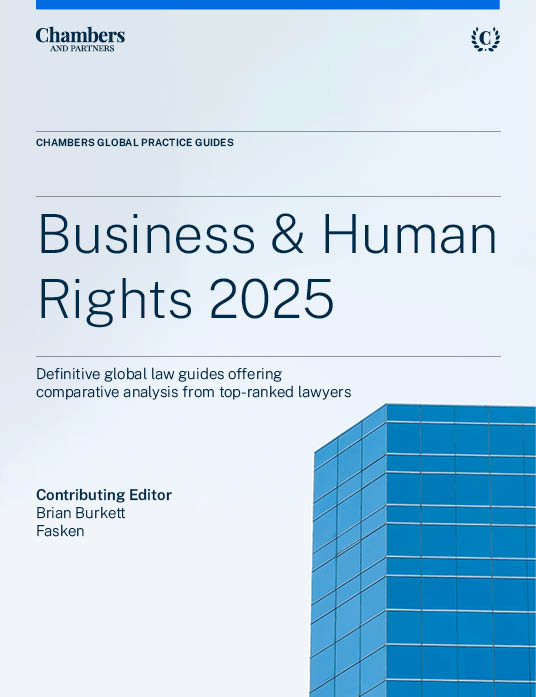
Business & Human Rights 2025
The new Business & Human Rights 2025 guide provides the latest legal commentary and up-to-date information on international treaties and conventions in this area, as well as corporate human rights due diligence, modern slavery legislation, transparency and reporting requirements, corporate liability, endorsement activity, and best practice recommendations.
Last Updated: June 12, 2025
The Global Evolution of Business and Human Rights Law
The modern history of “business and human rights” began in 2005 when then-Secretary General of the United Nations (UN) Kofi Annan appointed Professor John Ruggie of Harvard University as the UN’s special representative on business and human rights. With this appointment, the UN tasked Professor Ruggie with identifying and elaborating standards for multinational corporations and other business entities concerning human right issues, as well as with clarifying businesses’ role vis-à-vis governments in protecting against and remedying human rights abuses. In essence, the UN had asked Ruggie to develop – from the ground up – a new global framework for addressing human rights in the context of international business.
The 2008 “Protect, Respect, and Remedy” framework that Professor Ruggie ultimately developed, and then operationalised in the 2011 UN Guiding Principles on Business and Human Rights (the “UNGPs”), is now well established globally and a foundation for most of the legal and other initiatives related to corporate conduct that implicates human rights. At the same time, the UNGPs did not “freeze” the principles, standards, and processes of the business and human rights landscape in place.
On the contrary, the UNGPs were a launchpad from which a wide range of legal and other initiatives concerning businesses’ human rights obligations have sprung. Alongside these developments, we have witnessed a gradual evolution from an overriding reliance on voluntary human rights principles and related enforcement processes (“soft law”) to a greater place for the legal application and enforcement of human rights obligations on businesses around the world. These initiatives – both domestic and international – now make up an increasingly important body of law and best practices that compel greater business respect and action when it comes to addressing the human rights impacts of their operations.
International framework
To date, neither the UN nor any other international organisation has put in place a treaty or other legal instrument of general application that imposes legal obligations concerning human rights matters on businesses. Instead, the international framework consists of several international standards that set out voluntary principles and standards.
UNGPs
The most important of these international standards are the UNGPs. The UNGPs were unanimously adopted by the UN Human Rights council in June 2011. They are a body of principles that identify governments’ and businesses’ respective obligations to prevent, address and remedy human rights impacts associated with business activity. The UNGPs apply to businesses of all sizes and structures, regardless of whether they are multinational in nature or operate in a single jurisdiction.
The UNGPs are based on the three pillars of the “Protect, Respect, and Remedy” framework, as follows.
- Under Pillar One (Protect), governments are responsible for passing laws and taking other actions to ensure that individuals and communities are protected against human rights abuses.
- Under Pillar Two (Respect), businesses are required to ensure that they (and their agents) respect human rights in the course of their business activities. To do so, businesses must identify and adhere to the internationally recognised rights and standards that relate to their business operations. By way of example, in the area of labour rights, the UNGPs state that businesses should adhere to the principles and rights in the International Labour Organization (ILO)’s Fundamental Declaration, which are:
- freedom of association and the effective recognition of the right to collective bargaining;
- the elimination of forced or compulsory labour;
- the abolition of child labour; and
- the elimination of discrimination in employment and occupation.
The UNGPs go on to set out the policies and processes that a business should adopt in order to fulfil its duty to “respect” human rights. These include:
- a corporate policy commitment to respect human rights;
- a “human rights due diligence process” to identify, prevent and mitigate any negative human rights consequences that arise from the business’ activities; and
- processes to remedy any adverse human rights consequences in this regard.
- Under Pillar Three (Remedy), governments and businesses must put in place processes – both through legal and non-legal mechanisms – to effectively address and correct any negative human rights consequences.
Although the UNGPs do not impose concrete legal obligations on governments or businesses, they have become the most widely accepted and “authoritative” global standard in the business and human rights arena.
Other international standards
Today, the UNGPs exist alongside several other broadly adopted international standards that are either incorporated into the UNGPs themselves or aim to complement the UNGPs. These include the ILO’s Fundamental Declaration and Conventions, the ILO’s Tripartite Declaration Concerning Multinational Enterprises and Social Policy, and the OECD Guidelines on Multinational Enterprises.
There are also numerous standards that apply to specific industrial sectors. By way of example, the Voluntary Principles on Security and Human Rights play an important role in the global extractive and energy sectors.
National frameworks
National governments around the world have implemented a mix of legal and voluntary standards concerning business and human rights.
National action plans
Many governments have developed and adopted national action plans (NAPs) on business and human rights. The move to implement NAPs was driven by the UN Working Group on Business and Human Rights, which is the UN body tasked with implementing the UNGPs. A NAP is domestic policy statement and agenda that seeks, through domestic state action, to protect against adverse human rights impacts by business.
Even though NAPs are merely policy statements and do not themselves impose legal obligations, legislative action has emanated from a NAP in several countries. By way of example, the UK’s Modern Slavery Act and France’s Duty of Vigilance Law are connected to those countries’ NAPs. As of 2025, 34 national governments had launched NAPs, which are at various stages of development and implementation.
Modern slavery legislation
Several national governments have enacted legislation directed towards eliminating “modern slavery”, which is broadly defined as any form of forced or compulsory labour or human trafficking in a business operation or supply chain. Australia, Canada, France, Germany, and the UK have each adopted a form of modern slavery legislation – although there are important differences in the laws. Generally speaking, modern slavery legislation requires a business that operates in the country to produce an annual report or “modern slavery statement” identifying:
- which parts of their global operation or supply chain may carry a risk of modern slavery or other human rights abuses;
- what steps the business took in the past year to address those risks; and
- any actions taken to eliminate the risk of modern slavery or remedy any instances of modern slavery that have in fact arisen.
Human rights due diligence legislation
While modern slavery legislation generally only requires businesses to report on the human rights implications of their activities, mandatory human rights due diligence (mHRDD) legislation goes a step further by requiring businesses to take proactive, concrete measures to address and mitigate human rights risk in their operation and supply chain. By way of example, in 2023 Germany enacted its Supply Chain Act, which requires businesses that meet certain size thresholds to take several actions, including:
- establishing an internal risk management system to comply with the due diligence obligations in the Supply Chain Act;
- designating or appointing an internal “human rights officer”;
- conducting an annual human rights risk analysis of their operations and the operations of their suppliers (both direct and indirect);
- taking appropriate preventive measures to address any risks it identifies; and
- taking remedial action if a violation of an obligation occurs or is imminent.
Import bans on goods produced with forced labour
A number of countries are taking action to combat forced labour in supply chains via trade relationships or border enforcement action. This is often done in connection with modern slavery legislation: most of the above-mentioned countries who have implemented modern slavery legislation have also enacted a complementary prohibition on imports produced in whole or in part with forced and child labour. These prohibitions allow domestic customs authorities to stop and seize goods at the border if they are suspected of having been produced with forced labour or child labour.
Some countries that have not adopted traditional modern slavery or human rights due diligence legislation have also taken action at the border. Most notably, the USA enacted the Uyghur Forced Labor Prevention Act in 2022. The legislation targets forced labour in the Xinjiang Uyghur Autonomous Region in China by establishing a rebuttable presumption that goods mined, produced or manufactured wholly or in part in that region are made with forced labour and therefore are prohibited from import into the USA. US Customs and Border Protection has broad authority to enforce the import ban and, between June 2022 and May 2025, took action in respect of approximately USD3.7 billion worth of goods.
Corporate liability for human rights abuses
Victims of alleged human rights abuses and their advocates are increasingly turning to national courts to challenge corporate conduct in foreign jurisdictions. One of the main issues with which these courts have had to grapple is whether a domestic court in the multinational company’s home country can adjudicate a civil dispute concerning human rights abuses that allegedly occurred abroad in the multinational company’s foreign operation or its global supply chain. In relation to this, courts have been asked to impose liability on the parent company for the alleged wrongdoing of a subsidiary or contractor in another jurisdiction.
Although the courts’ ultimate findings in these cases invariably turn on the facts, courts in Canada, Germany, the Netherlands and the UK have concluded that – at least in some cases – they may adjudicate claims related to a domestic company’s alleged violations of human rights in another jurisdiction. The claims that have been brought to date have usually been based on traditional legal principles concerning intentional or negligent harm (eg, tort and negligence law).
However, an increasing number also allege breaches of customary international legal prohibitions on slavery and related internationally recognised human rights violations. The Supreme Court of Canada, for example, has found that – in certain factual circumstances – a Canada-based company could be held liable for such legal violations in a foreign jurisdiction. As a consequence of these developments, many North American and European-based multinationals must now assume that a domestic court’s jurisdiction does not end at the border.
Emerging developments – what lies ahead?
The trajectory of business and human rights in the global legal framework since 2011 is, on one level, a story of slowly but steadily increasing legal obligations and normative expectations for businesses’ human rights-related impacts. It is not clear today, however, whether that path will continue. Growing economic uncertainty, geopolitical tensions, and domestic political turmoil in some major countries suggest that the push to increase corporate obligations in this area could diminish.
Most recently, in April 2025, the Council of the European Union approved the “stop the clock” proposal that postpones the implementation of the EU’s ambitious Corporate Sustainability Reporting Directive (CSRD) and Corporate Sustainability Due Diligence Directive (CSDDD). These far-reaching EU initiatives would have greatly increased the human rights-related obligations on businesses active in the EU. Their postponement – and a related drive to simplify and relax some of the standards set out in the instruments – is a significant development in today’s business and human rights landscape. It remains to be seen whether it marks just a brief pause in the EU’s efforts to strengthen businesses’ human rights obligations or whether it heralds a broader global change in direction.



